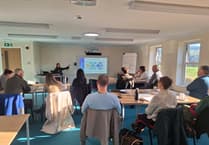A Manx company is on the frontline of cutting-edge medical research which could transform the lives of patients across the world - with a little help from one of the most sustainable products there is.
Virtually every therapeutic drug in the world, whether it’s an everyday staple like paracetamol or insulin, to the newest, most advanced treatments, are created in laboratories across the world, and all need to be purified for patient safety. Astrea Bioseparations’ products capture and purify the final product using state-of-the-art techniques. It’s a simple but essential step in a lifesaving industry.
The company was founded over 30 years ago in the Isle of Man and quickly expanded into the UK and beyond. Today it maintains a research and development laboratory in Cambridge, other sites in Montreal, Canada, and Gloucester, UK, and has just commissioned a new facility in Boston in the United States. But its main manufacturing base remains here in the island.
The company’s latest line of products is designed for cell and gene therapies, a new medical frontier which has revolutionary promise: instead of a lifetime of treatments, a short course of treatment could potentially cure some genetic disorders for life.
Astrea Bioseparations is one of the first to market with products specifically designed for this kind of work. Separation is all about product recovery rates, surface area, flow rates and reducing the natural waste inherent in the process, and the company’s new lineup offers massive improvements by any measure. They are expected to be hundreds of times more productive than the previous generation of separators, which weren’t designed for cell and gene therapy processes. ‘We’re hoping this positions us as a global leader in terms of Cell & Gene therapy pharmaceutical purification,’ operations director Chris Brown said. ‘These are groundbreaking products being made here on the Isle of Man.’
Cutting-edge treatments are an incredibly expensive business, with new drugs potentially costing millions of dollars per treatment. But if manufacturing yields and production rates can be massively increased by our new technology, Chris said, the costs could come down to a manageable level. ‘The whole premise behind it is if you can bring the cost of this down, you bring the price of those drugs down, and you make it more accessible to everybody.’ This is where technological development and process intensification has its own role to play in sustainability.
One of the crucial components in the product lineup is agarose, which is extracted from seaweed. ‘That's a sustainable product if ever there was one,’ Chris said. It forms the basis of the majority of our separation systems Over time the industry moved towards plastics and microplastics which, inevitably, have fallen out of favour due to the environmental impact. Seaweed is back, and Astrea Bioseparations has decades of experience to work with.
Another is the use of innovative designs with our “Evolve®” range of bioprocessing columns which encourage reusability by using Refresh Kits. Everyone understands the benefit of single use plastics in some arenas, like in healthcare or pharmaceuticals, where infection control and sterile environments are absolutely essential. But change is coming to the industry, however slowly, according to Ari Ojinaka, Astrea Bioseparations’ head of production: ‘Right now it's not a big topic, but over time we see that coming. There will be a big push in terms of sustainability and we are ahead of that curve.’
Astrea Bioseparations’ larger products are now manufactured with a modular design and are intended to be reused, with only the necessary parts replaced between manufacturing processes.
‘We’re offering a unique product where, rather than disposing of it, we are helping you replace the parts that touch your product,’ Ari said. ‘Right now we are the only company that offers this kind of approach to sustainability in our products.’





Comments
This article has no comments yet. Be the first to leave a comment.